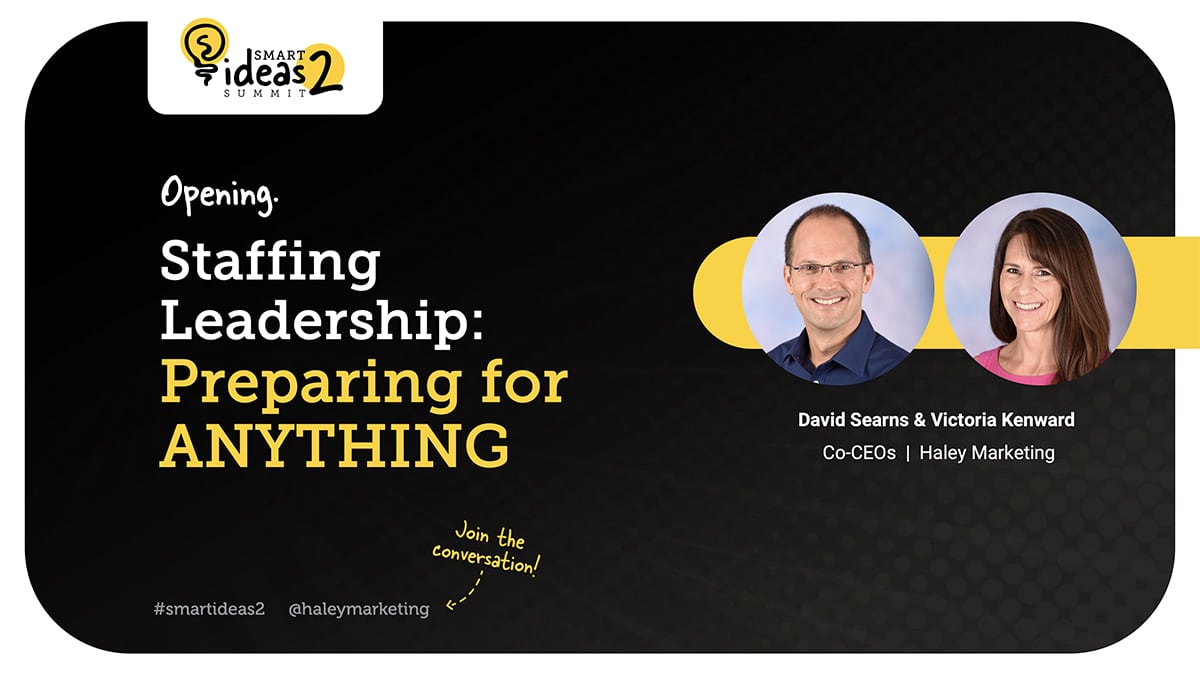The SMART IDEAS Summit 2 was an enormous success – thank you to everyone who attended!
If you missed a session or want to rewatch or share any of the presentations, we have great news:
The SMART IDEAS Summit 2 Content Is Available on Demand!
Access the free recordings and slides for 14 educational presentations from some of the smartest minds in staffing here. Simply enter your contact information to access the recordings, and then click on any session to start viewing!
Session Recap: Staffing Leadership – Preparing For Anything
In this presentation, David Searns and Victoria Kenward, Co-CEO’s of Haley Marketing, share tips to help staffing firms prepare for ANYTHING during uncertain economic times:
David Searns:
So there’s been a lot of talk in the news about what’s going on in the world. I hate turning on the news or social media right now.
Are we in a recession? Are we in a boom time?
Vicki, what are your thoughts? Where are we?
Victoria Kenward:
All right. I know there’s half the people out there, probably maybe even more are going to disagree with me, but I believe we’re in a recession. We’ve had two quarters of declining GDP. That’s the definition for recession. I don’t really care who you are, you can’t change that definition, but I guess really what’s important is inflation has skyrocketed cost. We’re seeing that everywhere. Go to the grocery store, you see it. Interest rates are rising. We’re almost at 6%. Home building activity has plummeted, as has the market has changed kind of to a buyer’s market. Consumer confidence, it is at its lowest point since the pandemic started. Hiring freezes and layoffs are becoming common, especially in the tech sector. And we’re seeing market turmoil. Have you looked at your 401k lately?
David Searns:
No, I don’t want to.
Victoria Kenward:
So I think we’re in a recession. What about you?
David Searns:
It’s funny, one thing I just saw this morning, it wasn’t even when we talked about this yesterday, Google just announced a cap on travel for their executives and no happy hours, no spending money on team builders. Think with Google, yeah, maybe they see a downturn, but I wouldn’t think that they’re taking it that hard yet, so I was surprised to see that.
But I’m going to take the counterpoint here. If you look at most of our clients, you look at the staffing industry, it’s still a boom. Unemployment just dropped over the summer to a 50 year low of 3.5%. The BLS is showing month after month the fact that the demand for labor continues to be very high. I don’t think we have a single client, maybe one or two, who are saying recruiting’s easy. Finding talent is exceptionally hard. And in a recession, you’re supposed to have layoffs and people are in abundance.
Also, you’re not supposed to see wages escalating in between the pandemic and the Great Resignation. We’ve seen a huge escalation in wages all the way from blue collar workers to senior level executives, and really that Great Resignation has become a great restructuring. Anyone who wants a job can have one almost wherever they want to work. And on average in the last three months, employers added 437,000 jobs a month. That’s not a recession.
Victoria Kenward:
Well, we can agree to disagree on that, but that’s why we created this talk.
Prepare for anything.
More accurately, plan for the worst, hope for the best. Right? So really it’s about developing a risk management plan, and that’s important no matter what’s going on in the economy or the world around us. Knowing the actions you’re going to take ahead of time is much easier than in the heat of the moment under duress. So let’s talk strategies to beat a recession. Go ahead, David, what do you have?
David Searns:
All right. I know we’re going to talk about two sides, playing defense and playing offense. So let me give you six strategies to help your business play defense.
Cut Non-Essential Costs
Number one, it’s one people tend to do first, is cutting costs, but really it’s about cutting non-essential costs and restructuring the costs that are essential. So review your profit and loss statement. Go look at everything in your chart of accounts. Which expenses are absolutely essential to running your business? Which are more nice to have? Which expenses might there be ways to get more return on the investment you’re making? You’re spending a lot of money, probably your biggest expense after the payroll of the temporary employees is your own internal people and salaries. Are you doing everything to help them maximize productivity? Another big one’s probably what you’re spending on job advertising. So are you getting the highest return on that investment?
One that’s a painful one to us, office space. So Vicki and I are sitting in the Haley Marketing head offices where there’s probably, what? Four of us here, maybe five of us in a 10,000 square foot building.
Victoria Kenward:
Yeah, I think five.
David Searns:
We’ve got this giant expense that we need to get rid of.
Then with those expenses, also talk to your vendors. Are there places you can negotiate discounts? Are there opportunities to pay off debt so you can lower what you’re spending or maybe things like the interest payments, or now you’re probably not going to be able to renegotiate a lower rate, but if you’ve got variable rate mortgages or variable credit card interest that you’re using to pay bills, make sure you’re paying that off.
Then the one that this is as much personal as it is business, go look at your credit card statement and look at all those reoccurring charges. We put a lot of things on credit to run Haley Marketing and it adds up to the tune of almost $50,000 a month in recurring expenses, for subscription based services. So there may be places that you can look at those bills and find ways to cut. So that’s strategy number one.
Find Ways to Get Work Done Without Adding Payroll
Strategy number two, you’re seeing the big tech companies do this. It’s reducing or freezing headcount and finding other ways to get work done. So maybe it’s through automation, offshoring, outsourcing, cross training people. So if you can find more ways to get the work done without having to add the fixed expense of additional payroll, that’s a great way to build a platform, not only to protect yourself, but for growth in opportunity, which we’re going to get to in a couple minutes.
Stockpile Cash
Third strategy, and this is hard in staffing, but is to stockpile cash as best you can. I remember back in 2001, when there was a downturn in the industry, and one of our big clients at the time, I asked him, I said, “How do you get through recessions?” He said, “During the good times, we just poured cash as much as we can.” They had like $50 million that they had saved over the years. They had done really well. But they said during a downturn, that gets us through. So are there ways to look at your cash systems to accelerate collections? The longer you’re sitting on AR, the more you’re paying in interest if you’re borrowing to pay payroll. Can you extend payments to some of your vendors?
Now, I wouldn’t just withhold paying them, but can you negotiate better terms with them? This is a time to train your salespeople and your recruiters. You really have to protect gross margins. How do we bump up gross margins? Talent’s scarce. This is a great time to bump up gross margins, bump up bill rates. And then there are expenses that we get hit with. Maybe we can’t change our bill rate to a client, but maybe there’s an opportunity to look at a contract and say, are there expenses we have that could be pass-throughs that we could then send on our client, even at cost, to defray some of your operating expenses?
Optimize Process and Eliminate Waste
All right, next strategy, getting to some of the ones that I think are really fun, is optimizing process. Eliminating waste. Look at your sales process. I was reading a stat last night that said the average effective rate of cold calling is 2.5%. So 97.5% of the time, people are wasting their time. So how do we help salespeople increase productivity through training, better targeting, integrating marketing with sales? On the recruiting side, how do we help recruiters be more productive with offshoring and AI tools for sourcing and automating repetitive tasks and eliminating that wasted job spend? How do we track the KPIs of our team more closely so we know which activities are really driving the most value, and where is the team struggling to hit their numbers so we can help train them or provide tools that they need? And again, look for ways that you can use outsourcing, offshoring, automation to make current team members more productive.
Invest in Technology
And the next one, this strategy is something I think everybody’s been doing, invest in technology to automate and streamline process. Try to look for something that’s got a 24-month or less payback. Vicki, you and I and Jeff just went to a really cool conference on AI in marketing and saw so many opportunities to increase productivity with technologies that are just coming on to the scene.
Lock in Longer-Term Contracts
And finally, look at your contracts, contract with your suppliers, contracts with your clients. Are there opportunities to extend those, to lock in what you’re paying for a longer time period so prices don’t go up? And with clients, to lock in future revenues, even if you can’t negotiate necessarily a bill rate increase to just ensure, hey, we’re going to have a certain revenue coming in? You’re just trying to protect yourself as best you can.
All right, that’s my six strategies on defense, Vicki. How about the playing offense?
Victoria Kenward:
Improve Customer Service
So the big one for me is about customer service. That’s my passion. That’s my background. That’s, I think, the key to this, it’s really get closer to your clients. If you can get really deeply embedded in their business, so go on site, use technology, find project solutions, spend more time at your client’s facilities and see what they’re doing firsthand, find their problems and become essential by taking ownership of their processes and outcomes. That’s going to lead to great success because they’re going to be loyal to you. Create action plans for individual clients, help them to forecast their future talent needs, and develop proactive plans. So that’s what you’re good at. You’re staffing companies, recruiting companies, you know how to do this, use that talent to get close to your clients.
You’re going to look for ways to improve that customer experience. If you can remove friction and all the needless steps in your process, you’re going to make it easier for a client to do business with you. They’re going to do business with you over your competitors. Just keep reminding our clients that you appreciate them and keep that service as high as possible. You’re going to be cutting costs, but you don’t want to cut anything that’s a service related cost. You want to make sure that you have the best service that’s possible because you need that during a downturn. You want that loyalty. You want to be helping people. And if you can keep in mind that you’re there to help them, that makes that so much easier.
Increase Your Marketing Spend
It’s a marketing company so I have to say this, and I totally believe it, you have to maintain or even increase your marketing. It’s really important. Otherwise, you become invisible. So you’re not going to get new clients if they don’t know you exist. You have to be out there. You have to be forward facing, and you will survive if they know you’re there, and they can buy from you. So if you’re not doing marketing automation right now, that is also something you really need to be thinking about, because that is a less expensive way to get more reach and more touches with your clients and your prospects. So you set it, and let it go, and it’s working for you instead of having people do it.
Don’t Slash Prices
It is not the time to cut your price. That jeopardizes future profits. If your clients are having a hard time paying, you can do things to help them pay. So maybe you consider a one-time payment extension or offer a short term discount. But if you cut your prices now, you’re going to have a very difficult time raising your prices later, and you need that profit right now. We need to keep the profits.
Consider Mergers and Acquisitions
And then, kind of bigger strategy, consider mergers and acquisitions. So Haley Marketing, a little preview here, we just completed a merger. We’ll tell you about that later in the day, but this is an opportunity to acquire at a lower cost, right? If a company’s struggling a little bit, you can probably get that price down. It’s an opportunity to take out competitors in your market. It’s an opportunity to expand into new markets and maybe skills. It’s an opportunity to access better people, maybe some technology that the other company has or improve processes by using what they have. If you can spend fixed overhead over a larger client base, you’ll see benefit for that too. So consider those mergers and acquisitions. Might seem counter to we’re saying, “Okay, well, keep your cash.” But if you’re using that cash to improve profitability, you’re doing the right things.
Recruit Top Talent
This is the time, I think, to be really offensive and opportunistic about accelerating your plans. This is the time to recruit the top talent. Other clients might have to, other companies might have to let go of their best people. You can scoop them up. Invest in new markets. Create additional revenue streams by modifying your service offerings and trying to add new products.
So, David, I know that this a marketing company and I mentioned marketing, but I know you want to talk more about marketing.
David Searns:
Oh, you knew I was chomping at the bit to add some more. And you said it, one of the big things that we’ve seen in past recessions, and we’ve been through three of them in Haley Marketing, is a lot of staffing companies, things get tough, and they cut what they’re doing. But if you go dark, your clients’ and your prospects’ perception is that something’s wrong, and you’re in trouble. Maybe you’re going to go out of business, and no one wants to work with a staffing company they perceive to be in trouble. So instead, what you want to do is be investing to drive sales growth, integrated direct marketing campaigns, digital marketing, referral partnerships, targeted promotions. You’re just trying to do things to make your sales reps’ lives easier and get in front of more employers more often.
You want to focus on companies that are going to continue to thrive in your local market or the industry you serve. Actually, sit down and map out who will be the best prospects depending on what the economy does. And in this market, I think this is normal in staffing, but remind everybody, everybody sells. We’ve gone through 10-plus years of mostly being order takers, and now it’s time that we have to get everybody trained on how to pick up the phone, how to sell staffing services, how to sell recruiting, and what the value of those services are.
Diversify Your Client Base
Vicki, you mentioned getting closer to your clients. I’m going to say diversify your client base. You need to try to have more clients you’re servicing. I remember in 2001, with a client in El Paso, Texas, they had 90% of their business in two clients. They lost both within, it was either three or six months. It cost them their company, and it cost them their marriage. It was just a really sad situation because they had too much client concentration. Now is the time when everybody needs to look to diversify their client base.
Target Competition-and Strengthen Your Own Brand
All right, this isn’t as nice, but go after your weaker competitors. Go after their clients with sales outreach, direct marketing, maybe even discounts or incentives to have them switch to you. This is a time to take them out of the market. Strengthen your own brand, update your messaging, your website, and increase your visibility both online and in the real world. All marketing is not digital. We love digital marketing, but you need to be visible where people are going to see you. And you want to strengthen not just your company’s brand, but the personal brands of your salespeople and recruiter so that when people are looking for you, they’re looking at your company, looking at your team, they’re seeing your organization everywhere.
Examine Your Marketing Mix
This is one of my favorites: look at your marketing mix. So your product, your price, your place, your promotion. In this downturn, there’s going to be probably more opportunity than we’ve ever had before to create new staffing products and pricing models. We’re seeing it with apps and online staffing. There’ll be new delivery models, things like global sourcing and putting together global talent teams, replacing hourly bill rates and percentage of salary fees with new ways to charge for services. Companies that invent these new models, sort of like Uber did with taxi drivers, will thrive in the next recession.
Court Smaller Businesses
Another thing to think about is go small. A lot of small businesses will be the first ones to recover from the recession, and they’re going to need hiring help. We know firsthand. We hate hiring as a small business. It’s a pain, but if you can find ways to cost-effectively serve the smaller client, you can build a very loyal customer base where there’s really not that much competition.
Add Value
You can also go upstream trying to add more value in the value chain to your clients like project solutions, on sites, maybe as high as MSP or VMS technology, offering recruitment process outsourcing in some forms of human resource outsourcing in smaller companies. SIA’s Barry Asin’s going to be on later, has talked for years about total talent management. And now with people needing to build global talent pools with all this remote work, this is such an enormous opportunity.
Related to that, it’s also going to be a great time to help your clients top-grade talent. There will be good people on the market. And that kind of goes to just becoming a resource to your clients. It’s how we got through a number of past recessions, is through education, teaching people how to use staffing to get through their own business challenges, to drive revenues, to control costs. Educate them about all the ways they can use your services. Make sure your salespeople and your recruiters understand the economic value of staffing so they can sell it.
What we’ve seen in the past:
Companies that are more aggressive in marketing obtain 4.5 times market share gain versus competitors who cut back.
They fell less deeply than their competitors, they recovered sooner, and we saw a number of them recovered at more than two times the rate of the staffing industry when the recovery started. So a lot of things to do with marketing. Thanks for letting me go deep, Vicki.
Victoria Kenward:
So I think every recession’s a little bit different, and those numbers are pretty phenomenal, but we’ve seen this in every recession we’ve been through, and we’ve been through two or three of them. Right? So really you need to continue marketing. So I think the biggest point, if you take one thing away here, is that you need to start now.
Use the demand for staffing while it’s strong to work on your defense and invest in your offense.
Don’t Panic
Some mistakes to avoid right now, so just a few here, don’t panic. If you only focus on cutting costs, you’re going to miss out on opportunities. So you’ve got to do both sides, defense and offense. Don’t cut your marketing. I know we’re a marketing firm and I know that’s the message we have to get out there, but it’s really important. 4.5 times the market share. Remember that. Don’t slash your prices. That’s future profit you’re betting here, so don’t do that. That’s probably the worst thing you could do right now. And don’t just sit back and hope that nothing is going to happen, and it’s going to get better. I wouldn’t bet on, is this a recession or is this not a recession? I wouldn’t bet either way. I would just start to plan. And then, it’s probably not the time to be looking at hot new markets in the next trend. See what works and do more of it.
When it comes to a recession, this is advice from David’s father, my father-in-law, choose not to participate. Business still takes place. Companies still grow. You can choose to use this as an opportunity, so just choose not to participate if it is a recession. And if you need resources, you can go to Haleymarketing’s Brainfuel, and there’s a ton of resources there for you.
Want more smart ideas from the smartest minds in staffing?
Access the free recordings and slides for 14 educational presentations from the SMART IDEAS Summit 2.













